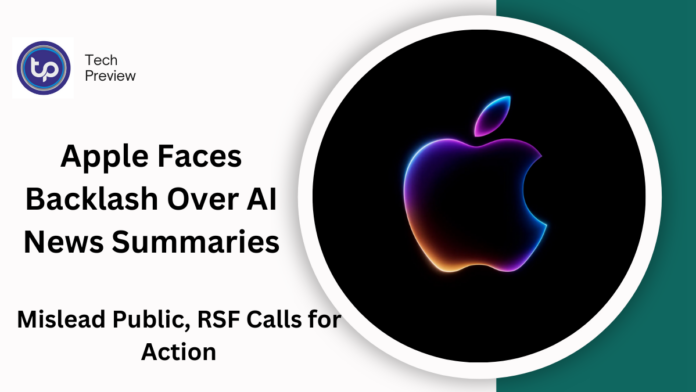Apple’s AI-driven news summarization feature, Apple Intelligence, is facing severe criticism after an incident where it falsely reported the death of Luigi Mangione, the alleged shooter in the UnitedHealth case.
The automated news summary, which suggested that Mangione died from a self-inflicted gunshot wound, sparked outrage, with Reporters Without Borders (RSF) demanding that Apple immediately remove the feature.
The misleading summary was part of a broader concern over AI’s growing role in news dissemination, raising alarms about the reliability and accountability of artificial intelligence when it comes to reporting on sensitive events.
Understanding the Issue: False Information and its Impact
Apple Intelligence, designed to provide quick news updates through automated summaries, can deliver digestible information on users’ lock screens.
While the feature is intended to save time and help users stay informed, it has recently come under fire for disseminating inaccurate content.
One such example occurred when the AI incorrectly summarized a BBC article, stating that Luigi Mangione, the suspected shooter in a UnitedHealth incident, had died from a self-inflicted gunshot.
MUST READ : AirPods’ $18 Billion Revenue: A Phenomenal Success for Apple in 2023
However, Mangione is alive and awaiting trial. The incorrect summary raised concerns about the reliability of AI in delivering fact-based news and has led to a significant backlash.
The Responsibility of AI in Journalism
RSF’s chief, Vincent Berthier, emphasized the potential dangers of relying on AI for generating news, stating, “AIs are probability machines, and facts can’t be decided by a roll of the dice.” He pointed out that AI, while efficient, is not infallible.
The erroneous report not only harms the credibility of the media outlets involved but also poses a danger to the public, who rely on accurate and timely information.
The false claim about Mangione’s death was not an isolated incident. There were also reports of Apple Intelligence falsely stating that Israeli Prime Minister Benjamin Netanyahu had been arrested.
These errors highlight a growing concern in the industry about the consequences of AI-driven journalism.
Legal and Ethical Concerns Over AI-Generated Content
The incident has prompted calls for more regulation on AI news generation, especially as the technology becomes more integrated into media practices. RSF has criticized European lawmakers for failing to include content-generating AI tools in the high-risk category under the European Union’s AI Act.
Without proper oversight, Berthier warns, AI systems may operate in a legal gray area, allowing them to generate misinformation without proper accountability.
This lack of regulation raises important questions about how to balance innovation with responsibility in AI’s role within the media landscape.
Apple’s Response to the Criticism
Despite the controversy, Apple has yet to issue an official response to RSF’s call for the removal of Apple Intelligence. However, Apple CEO Tim Cook acknowledged that AI, like any new technology, is not immune to errors, often referred to as “hallucinations.”
The term “hallucinations” describes instances where AI systems generate false or nonsensical content, a common issue across many platforms using AI, including Google and X.
These incidents highlight the need for robust quality control measures and transparency in AI-driven features, especially when they involve the dissemination of news.
The BBC’s Concern and Request for Accountability
The BBC, a respected and trusted news outlet, has also voiced concerns over the AI-generated summary, filing a formal complaint with Apple.
The BBC emphasized the importance of maintaining editorial integrity, even in AI-generated content. The organization has called for greater transparency in how Apple Intelligence operates, ensuring that the tool does not compromise its reputation or spread misinformation.
AI in Journalism: A Double-Edged Sword
The rise of AI tools in journalism offers numerous advantages, including the ability to provide real-time updates, generate summaries, and personalize content for individual users. However, as demonstrated by these incidents, there are clear risks involved.
AI’s inability to fully comprehend context or subtle details means that mistakes can easily be made, which could have significant consequences, especially in reporting on high-profile or sensitive news stories.
As artificial intelligence continues to evolve, it’s essential for tech companies like Apple to implement safeguards and oversight to ensure that these tools are used responsibly.
The widespread use of AI in media may ultimately transform how news is consumed, but it must be done in a way that prioritizes accuracy, fairness, and accountability.
Conclusion
The false summaries produced by Apple Intelligence serve as a stark reminder of the challenges of using AI in journalism.
While AI can streamline information delivery and improve accessibility, it also carries the risk of generating inaccurate content. RSF’s call for Apple to remove the feature reflects the growing concern over the role of AI in the media industry.
As AI tools become more integrated into our daily lives, ensuring their reliability and accountability will be crucial to maintaining trust in the media.
People May Ask
What is Apple Intelligence?
Apple Intelligence is an AI-powered feature that generates brief summaries of news articles and presents them on the user’s lock screen. Its purpose is to provide quick, digestible updates about current events.
Why is RSF criticizing Apple Intelligence?
Reporters Without Borders (RSF) is concerned that the AI system can spread misinformation, as it did with a false summary about Luigi Mangione’s death. RSF believes that AI-driven content could damage the credibility of trusted media outlets and mislead the public.
What is the issue with AI in journalism?
AI tools, such as Apple Intelligence, can generate inaccurate content because they rely on algorithms rather than human judgment. These errors, known as “hallucinations,” can result in the spread of false information, which undermines the trust in media and public awareness.
Has Apple addressed the issue raised by RSF?
Apple has not yet responded to RSF’s call to remove Apple Intelligence, although CEO Tim Cook has acknowledged that AI systems are prone to making errors.
What actions has the BBC taken?
The BBC has filed a formal complaint with Apple regarding the misleading AI summary, emphasizing the importance of accuracy in its content, even in AI-generated alerts.
Click here to learn more.








